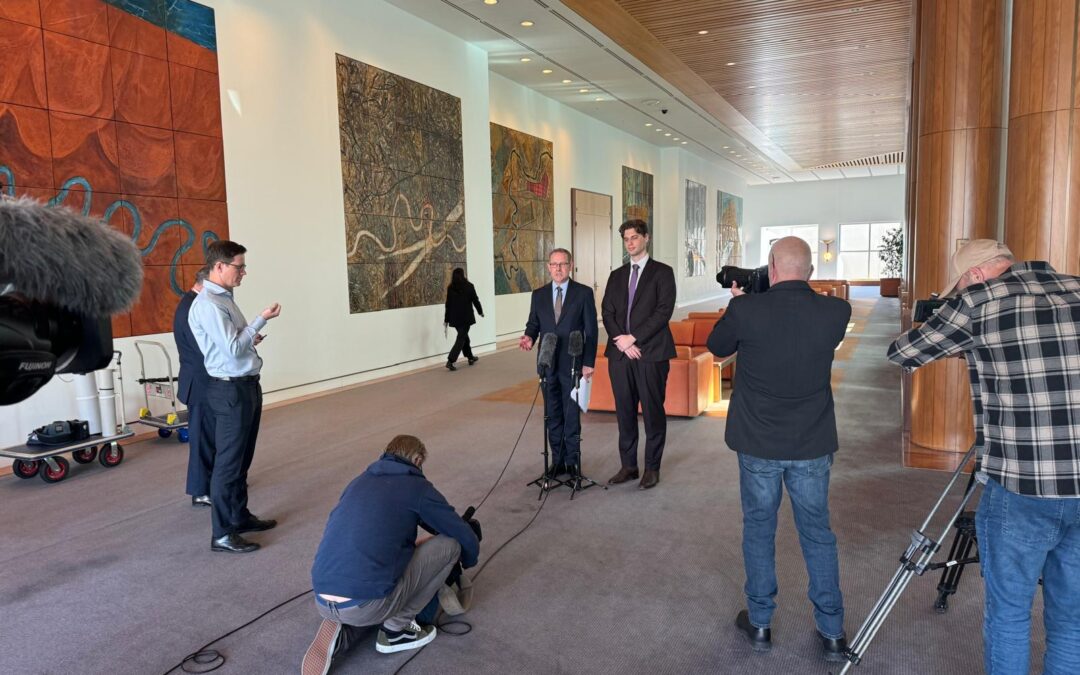by Craig Sullivan | Jul 25, 2024 | Media Release
The Australian Chamber of Commerce and Industry wishes to thank Brendan O’Connor for his contribution to public life, especially as Skills and Training Minister.
Australia’s largest and most representative business network has recognised Minister O’Connor’s achievements in particular his establishment of Job and Skills Australia and the Jobs and Skills Councils.
ACCI chief executive officer Andrew McKellar praised Minister O’Connor for his engagement and accessibility to all stakeholders.
“The business community has benefited from Minister O’Connor’s strong engagement and practical vision to reposition our vocational, education and training system to be more responsive to emerging skills needs and priorities.
“Minister O’Connor has created a legacy of enhanced co-ordination and oversight of our national skills and training infrastructure which will be more tailored to the needs of business and industry across Australia.
“He made an important contribution and brought great experience and judgement to his role as a leading cabinet minister in the current government.”
“He has worked extremely hard and we wish him and his family all the best for the future.”

by Craig Sullivan | Jul 22, 2024 | Media Release
Almost half of small business owners have considered closure in the past twelve months according to a survey by Australia’s largest and most representative business network.
The 2024 Small Business Conditions Survey compiled by the Australian Chamber of Commerce and Industry found that small business owners feel neglected and are being strangled by red tape.
The survey took the pulse of small businesses throughout the country and found:
· 45 per cent of small business owners have considered closing or leaving in the past 12 months.
· 82 per cent of small business owners said that red tape is having a major or moderate impact on their business.
· 50 per cent of respondents said they were spending more time on red tape than 12 months ago.
· 40 per cent said they will make a reduced or a significantly reduced profit this financial year compared to the previous year.
ACCI chief executive officer Andrew McKellar says the survey shows that small businesses are in crisis.
“Small businesses are the backbone of our economy. However, our new survey shows the dire conditions they face they and are often a second thought when it comes to policy making, legislation and regulations,” Mr McKellar said.
The survey shows that policy makers and regulators need to do better to help small businesses and not tie them up in regulations and red tape.
“Small businesses need more consideration from governments, especially when they decide to change rules and regulations. Governments tend to be very good at introducing new regulations but not so good at explaining those changes.
“Saving time on administration and compliance is also another way to boost productivity,” Mr McKellar said.
Respondents to the survey also nominated increasing input costs as the greatest pressure facing their small businesses, followed by skills and worker shortages, then government regulation.
Over half of the respondents said the greatest expense to their small business is overcoming skills and worker shortages.
“The current environment makes it hard for small businesses to create jobs and employ people,” Mr McKellar said.
Changes to industrial relations laws were also a major concern for small businesses, with more than half saying the legislation will have a damaging or extremely damaging impact.
“We have yet to see the full impact of the government’s industrial relations laws flow through, but small businesses are very worried about the potential for unions to interfere with their decision-making,” Mr McKellar said.
“In this environment of labour shortages and inflated energy costs, already putting pressure on small businesses, the government’s IR law changes are a further kick in the teeth.”
You can read the full survey here.
You can access the fact sheet here.

by Craig Sullivan | Jun 26, 2024 | Media Release
Governments must act immediately to get more gas supply into the grid, Australia’s largest and most representative business network said today.
Australian Chamber of Commerce and Industry chief executive officer Andrew McKellar said the report issued by the Australian Energy Market Operator (AEMO) should ring alarm bells inside federal and state governments.
AEMO has indicated that coal fired power stations will close at a much faster rate than is currently scheduled.
Yet the transition to renewables as coal power is phased out is running well behind schedule.
“AEMO is forecasting that demand for gas power production will double by 2050, but gas reserves are dwindling and stronger co-ordination across all levels of government is required to secure the necessary supply needed for the future,” Mr McKellar said
“Adding more gas into the energy mix in the short to medium term will make that transition to renewables much smoother and help us to reach net zero carbon by 2050”.
“Businesses now face even higher energy costs with the early closure of coal and slow rollout of renewables increasing pressure on the system.
“This is a wake-up call to our governments who have done little to get extra gas into the energy grid, despite repeated warnings from the gas industry of a looming shortage.”
Last week AEMO sent a threat notice to the gas industry, warning that gas supply on the east coast may be inadequate to meet demand in 2024.
The situation is expected to get even worse over the next three years.
The notice follows high demand for heating during a cold snap in eastern Australia and an earlier warning from AEMO that generators may need to burn diesel to secure electricity supply.
Mr McKellar said urgent action is needed to get more investment in gas exploration and supply and that the threat of forced shutdowns of manufacturing would hit business hard.
“At a time of low economic growth and rising labour costs this is the last thing business needs,” Mr McKellar said.
“Attracting new investment to open fresh gas reserves is desperately needed if we are to meet current demand as well as the increasing demand for power generation over the next 25 years.”

by Craig Sullivan | Jun 25, 2024 | Media Release
After a slower than usual start to the year, new orders lodged with Australian manufacturers rebounded, the latest ACCI-Westpac Survey of Industrial Trends has found.
Westpac economist Ryan Wells said that the improvement in demand marks a welcome turnaround from recent weakness, although there remain challenges and uncertainties in the outlook for manufacturers.
“The Westpac-ACCI Actual Composite improved materially heading into mid-year, lifting from 43.4 in the March quarter to 54.1 in the June quarter,” Mr Wells said.
“With a reading above the break-even threshold of 50, this indicates that conditions are improving in the manufacturing sector. Compositionally, a bounce in new orders and an increase in output were the key drivers, while respondents reported further declines in employment and overtime.
“The broader economic backdrop for manufacturers has been challenging over the past year, highlighted by stalling new orders growth. This culminated in a material decline in orders in March 2024, marking a slower than usual return to business from the summer holidays.
“That weakness was not expected to last though, and orders have posted a solid rebound in June 2024, with a net 20 per cent of firms reporting a rise.
“The Expected Composite moderated slightly, from 54.7 in March to 52.8 in June, indicating that firms still expect demand conditions to improve, albeit at a more modest pace.
“That said, supply-side issues remain a key concern of manufacturers. The improvement in labour availability last quarter looks to have been temporary, with a net 12.1 per cent of respondents finding labour ‘more difficult to find’, providing manufacturers with limited scope to expand the size of their workforce.
“Additionally, cost pressures facing manufacturers remain acute and incredibly volatile. The latest survey finds a net 71 per cent of firms reported a rise in average unit costs, the highest result since the cycle peak of a net 76 per cent in December 2022.
“While costs have eased slightly on a year-average basis, from a net 68 per cent in June 2022 to 51 per cent in June 2023, they remain well above the 2009-2019 average of 19 per cent.
“The mood of manufacturers about the general business outlook for the next six months has improved but remains deeply pessimistic. Those expecting a deterioration outnumber those expecting an improvement by a net 42 per cent in June, compared to a net 56 per cent in March.
“Profit expectations improved, following the bounce in demand. However, they remain well below average levels, as elevated and volatile cost pressures continue to loom over manufacturers. On balance, respondents neither expect an improvement or a deterioration in profits over the coming year.
ACCI chief executive Andrew McKellar says the survey results show the economy is walking a tight rope.
“The challenges we are already seeing for businesses will be compounded by inflexible, productivity-sapping industrial relations legislation over the coming months,” Mr McKellar said.
“More business investment is needed to lift productivity and drive economic activity.”
Mr McKellar urged the federal government to take immediate action to address stalled productivity.
“Lifting productivity has been identified as a key priority by the government and it must take decisive action to support Australia’s businesses immediately,” Mr McKellar said.
He also pointed to the recent minimum wage increase awarded by the Fair Work Commission as another burden for businesses to bear.
“The cost-of-doing-business pressures are mounting and significant wage increases through the annual wage review will heavily impact businesses,” Mr McKellar said.
See the report here

by Craig Sullivan | Jun 19, 2024 | Media Release
The Coalition has today formally committed to nuclear energy in Australia should it win government. This would be a significant change in energy policy in Australia.
The Australian Chamber of Commerce and Industry has a policy of fuel-source neutrality, meaning that it supports allowing all fuel sources to compete in providing our energy needs while meeting our emissions targets.
“Maximising energy options minimises the risk of being caught out down the track with higher cost electricity,” ACCI chief of policy and advocacy David Alexander said.
“Australian businesses need affordable and reliable energy over coming decades, and our energy costs will need to be competitive with other countries.
“We cannot know the future competitiveness of individual energy sources over future decades, but the way to ensure that we don’t get caught short down the track is to allow the full range of energy sources.”
Mr Alexander said ACCI recognises the burden high energy costs have on businesses and their customers.
“As we go down the path to net zero it is important that we focus on real-world consequences and keep costs minimised for business and the broader community,” Mr Alexander said.

by Ashley Gardiner | Jun 6, 2024 | Media Release
A union’s proposal to eliminate junior wage rates would have severe implications for young workers, locking them out of an opportunity for their first job.
First jobs at junior pay rates are a crucial stepping stone in their development, Australia’s largest and most representative business network said.
ACCI chief of policy and advocacy David Alexander said it was an unrealistic proposal that will make it almost impossible for young workers to get their first job.
“Calls to abolish junior pay rates is another example of the usual ignorance of economics from unions,” Mr Alexander said.
“Having no junior pay rates would make hiring young people far less attractive to businesses.
“Taking on a worker with minimal experience requires extra risk and extra effort – they do not have the work or life experience that older adults have.
“This would be catastrophic for young workers, especially in retail, who would struggle to get a start in the workplace.”
The Shop Distributive and Allied Employees Association has submitted the proposal to be debated as a resolution at the ACTU congress in Adelaide.
The union has already proposed resolutions to increase the minimum annual leave days for employees from 20 to 25 days and to introduce a four-day working week.
Mr Alexander said these proposals were as unrealistic as axing junior pay rates.
“Mandating a four-day work week across the economy ignores the unique settings of particular industries or workplaces and would suffocate the already-flatlining productivity rate,” Mr Alexander said.
“Compelling employers to provide another week of leave for employees would be a similarly damaging step.
“At a time when every economist points to declining productivity, the union movement is coming up with ideas to make it worse.
“As we saw in yesterday’s national accounts figures, productivity has stalled, and until we see a real lift, economic growth will remain stubbornly low or even become negative.”
“Proposals like these will only harm our economy more and must be rejected.”




